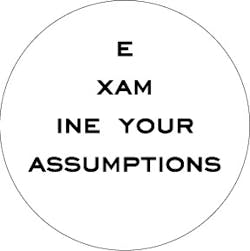An argument can be made that this is what perspective is all about. I’m not so sure.
Like this article? Sign up for our enews blasts here.
The perspective I’m talking about isn’t the kind that gives a painting depth. It’s the kind that materializes when you look back to see how all the assumptions you’ve made worked out; the kind that allows two individuals to experience the same phenomenon while interpreting it as if it was absolutely unique to each of them.
This seems to happen a lot in the world you, I and the motoring public all share. Perhaps that is why I’m so aware of it.
For instance, a motorist’s late-model Chevy Pickup fails to start without any warning. The battery is fully discharged, so the owner assumes therein lies the problem. He removes it from the vehicle and takes it to a large automotive retail outlet to have it checked. They tell him what he already knows: the battery is “dead.” So, he chooses to replace it with the less expensive of several options. Because he hasn’t been told, he assumes there is no real difference in battery qualities and the choice is irrelevant.
A week later, the vehicle fails to start again, so he has it towed to a transmission shop — a logical assumption if the belief is that all auto repair facilities are the same and experience is meaningless.
The transmission shop apparently shares that belief. They accept the vehicle for repair and tell him the battery is fine, but the serpentine belt is bad and the alternator has failed. He believes them, but their estimate is too high. He asks what it will cost if he purchases the belt and the replacement alternator. He assumes it’s OK. They tell him to subtract the parts cost. Apparently, it is.
The vehicle owner goes back to the retailer and asks for a belt and a rebuilt alternator. He has a choice: one in stock and another, a significantly more expensive unit, that has to be ordered. He chooses the less expensive alternator and the transmission shop installs it.
I’m sure he felt really good about his assumptions, at least until the vehicle’s charging system warning lamp began to flicker. He takes it back to the transmission shop to find out what has gone wrong. Unfortunately, they have no idea. Everything is working fine; everything except for the light.
They sent it to us. We call the motorist and listen to his story. We tell him what it would cost to check the vehicle out and get his authorization to proceed with the inspection and testing necessary to isolate the problem.
Unwilling to assume anything, I checked the part number on his alternator against the cross-reference guide — it didn’t cross. I called our supplier and asked for application, price and availability. There were two possibilities. Neither of them crossed. I checked the Pickup’s RPO code, figured out which alternator was the correct one and realized the number on his alternator didn’t cross. So, I called the vehicle owner and told him what it would cost to replace his alternator with the correct one.
“If I go and get it, will you put it on…” he asks.
“No,” I said.
“Why?”
“Please review your current circumstance,” I advised.
“Can you cut me a break? I’ve spent a lot of money on this truck, and I’m broke,” he says.
“You didn’t spend it here; and, if you had, you would have known what was wrong with the vehicle and it would have cost you less,” I said. Harsh, I know, but honest and accurate.
“Fine, then fix it!” he yells. And, we did.
Not as simple or easy as it sounds. He needed to return his alternator for credit. My supplier needed a core. The retailer needed a “pro” at the counter capable of identifying the correct application and the transmission shop needed to stick a little closer to their own knitting.
We ordered and installed the right alternator and solved the problem.
There were a lot of assumptions made by a lot of different people, each one capable of driving a different set of actions and different results.
What are your assumptions? How do they impact your perspective and how does your perspective drive your behavior? Do you know? Don’t you think you should?


